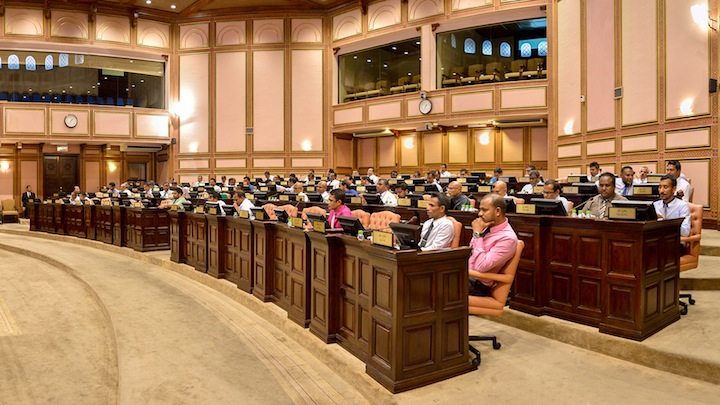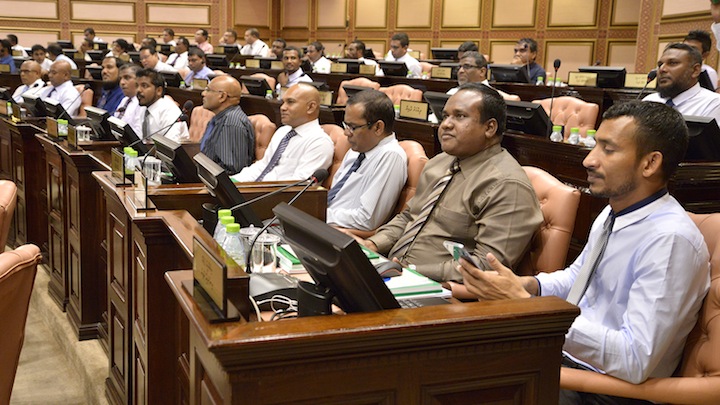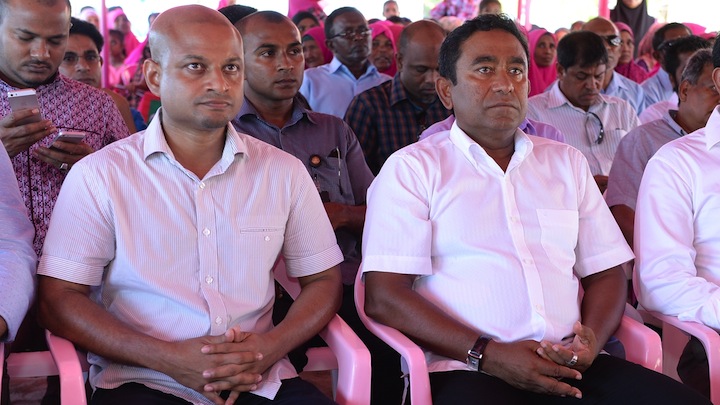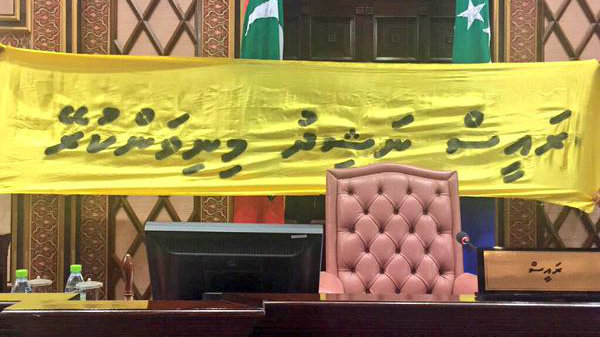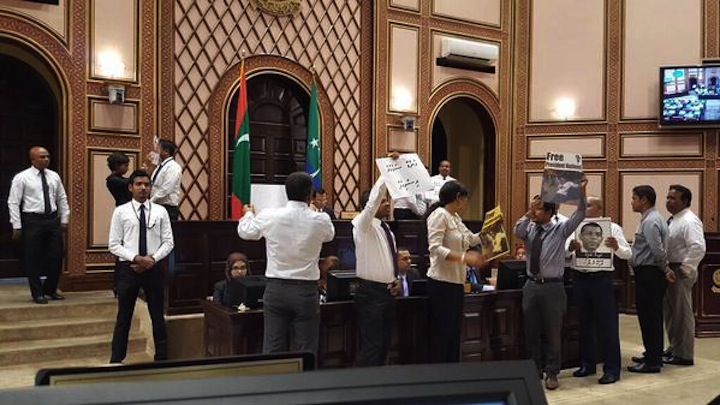The parliament today passed the first amendment to the constitution with overwhelming tripartisan support to set an age limit of 30 to 65 years for the presidency and the vice presidency.
A total of 78 MPs of the ruling Progressive Party of Maldives-Maldives Development Alliance (PPM-MDA) coalition and the opposition Maldivian Democratic Party (MDP) and Jumhooree Party (JP) voted in favour of the proposed change.
The ruling coalition is seeking to replace vice-president Dr Mohamed Jameel Ahmed with tourism minister Ahmed Adeeb, who is 33 and ineligible for the post.
The constitution states that presidential and vice presidential candidates must be 35 years of age.
Pro-government MPs have publicly accused Jameel of disloyalty and incompetence, but opposition politicians and some media outlets have claimed that President Abdulla Yameen is seeking a loyal deputy ahead of a life-threatening surgery.
Several PPM MPs have said that Adeeb will become the next vice president, but Jameel can only be replaced if he either resigns or is impeached with a two-third majority of parliament.
The revision to article 109(c) marks the first time the constitution has been changed since its adoption in August 2008. The change will take effect upon ratification by the president.
The amendment was passed with 78 votes in favour and two against. Independent MP Ahmed Mahloof and JP MP Ali Hussain cast dissenting votes.
Mahloof said in a tweet last night that he would vote against the amendment. “I respect JP and MDP’s decision,” he added.
The support of MDP and JP MPs was necessary to pass the amendment as the PPM-MDA coalition has 48 seats in the 85-member house and a three-quarters majority or 64 votes was needed to amend the constitution.
The MDP and JP parliamentary groups issued three-line whips last night for its MPs to back the amendment, prompting speculation of a deal with the government after former President Mohamed Nasheed’s house arrest was extended to eight weeks last night.
MDP parliamentary group leader Ibrahim Mohamed Solih has said that the main opposition party stood to gain more from backing the amendments than opposing it.
Nasheed, who was serving a 13-year prison sentence at the high-security Maafushi jail, was transferred to house arrest on Sunday. President Yameen authorised the transfer.
Nasheed’s arrest in February and subsequent conviction on terrorism charges triggered a political crisis with daily protests, mass anti-government demonstrations, and hundreds of arrests.
The 19-day terrorism trial was widely criticised over its apparent lack of due process and international pressure has been mounting on the government to release the opposition leader and other jailed “political prisoners.”
JP leader Gasim Ibrahim, who has been out of the country since late April, had urged JP MPs to vote for the amendments and announced his retirement from politics. The amendments bar the business tycoon from contesting the 2018 presidential election as he would be 66 years at the time.
The government has frozen the bank accounts of Gasim’s Villa Group and several subsidiary companies over US$90.4 million allegedly owed as unpaid rent and fines.
Two senior JP members, Ameen Ibrahim and Sobah Rasheed, are meanwhile overseas in self-imposed exile after the prosecutor general pressed terrorism charges against the pair in the wake of a mass protest on May 1.
The JP leaders along with Adhaalath Party president Sheikh Imran Abdulla are accused of inciting violence at the 20,000-strong anti-government rally.
During today’s sitting of parliament, PPM MP Ahmed Nihan said ruling coalition MPs will not speak during the final debate on the amendments.
MDP MP Ibrahim Naseer said he backed the amendment as the party has issued a three-line whip for the vote.
The MDP has always advocated increasing opportunities for youth, he said, and lowering the age limit for presidential candidates would enable young people to reach the highest office of the state.
No other MP asked to speak during the debate.
The amendment was submitted earlier this month by MDA MP Mohamed Ismail, who said during the preliminary debate that he proposed the 65-year cap as the president should be “young, intelligent, daring, active, and energetic.”
The deal
The apparent deal between the government and opposition parties has divided opinion among opposition supporters and sparked debate on social media.
While some have condemned amending the constitution to benefit an individual and accused opposition MPs of abandoning principles, others argued the possible release of opposition politicians would justify the move.
Yes. It is a deal. A deal of the party not of individuals. Will it benefit ..I don’t know I hope it will.
— Fayyaz Ismail (@faya_i) June 23, 2015
I am not principled. I prefer practicality always. — Fayyaz Ismail (@faya_i) June 23, 2015
Just spoke with President Nasheed & PG Leader Ibu. We are united in our decision. Let us all stick together. Think + pic.twitter.com/gtqxAmBWIm
— Ali Waheed (@ali20waheed) June 23, 2015
MDP MP Fayyaz Ismail and MDP chairperson Ali Waheed defended the party’s stand, but former attorney general Husnu Suood questioned its wisdom.
There is no rational basis to support the constitutional amendment, except for personal gains. It will only strengthen the dictatorship. — Husnu Al Suood (@hsuood) June 23, 2015
Did JP sell its vote to let its leader to come to Maldives? Did MDP sell its votes for 8 weeks of house arrest? Goodness. Go get a life.
— Husnu Al Suood (@hsuood) June 23, 2015
Maldivians must not allow parliamentarians amending constitution for personal political expediency. Destabilizes country’s governance system — Husnu Al Suood (@hsuood) June 23, 2015
The problem is not the substance of Constitution amendment – the ages of Prez & VP – but the manner and purpose of that amendment. — Aishath Velezinee (@Velezinee) June 24, 2015
So the so-called ‘Adeeb Amendment’ is intended to force MDP to choose between Nasheed’s freedom & Constitution? #Democracy, according to PPM — AzraNaseem (@Manje) June 23, 2015
JP MP Ali Hussain suggested that the opposition has capitulated while JP deputy leader Dr Hussain Rasheed Hassan said the MDP and JP has made a “mockery” of supporters who came out to protest under the ‘Maldivians against tyranny’ banner.
Mirey JP adhi #MDP in ninmi ninmi ninmumakee #AniyaaverikanNimman nikuiy aammu meehunah kuri malaamaatheh. https://t.co/jqGvz24dM4
— Hussain R. Hassan (@DrHussainHassan) June 23, 2015
For what ever reason the opposition has caved in while majority of the citizens are on the cliff. Call it the bitter political reality. — Ali Hussain (@AleeVoice) June 24, 2015
There is a time for principles. There is a time for pragmatism. The wise know the difference. — A Ghafoor Mohamed (@aghafoormohamed) June 23, 2015
@hoodlington Rather elitist, no? Lead the common man on basis of principles, then ditch them & say they just don’t get it? @aghafoormohamed — AzraNaseem (@Manje) June 23, 2015
@aghafoormohamed I see it as securing an advantage out of an unpleasant inevitability. @Manje — Hooderson (@hoodlington) June 23, 2015
It’s more complex than a simple case of vote buying. It’s a place that’s harder than the space between the rock & the hard place. — Dhiyana (@dhiyanasaid) June 24, 2015
@mabrouq true. but we don’t have any faith in politicians anymore @MohamedNasheed — kuhthaa (@kuhthaa) June 23, 2015
— Hasan A. Hilmy (@HasanHilmy) June 24, 2015
Find MDP’s decision unwise, but more unwise to abandon the ship when it needs us most. Don’t let disillusionment get the best of you #KKBK.
— Mickail Naseem (@MickailNaseem) June 24, 2015
I don’t know how I feel about having to hold MDP and PPM to the same standards. Because I don’t hold PPM to any. https://t.co/ZLNGnVKPCL
— Yameen Rasheed (@yaamyn) June 24, 2015
